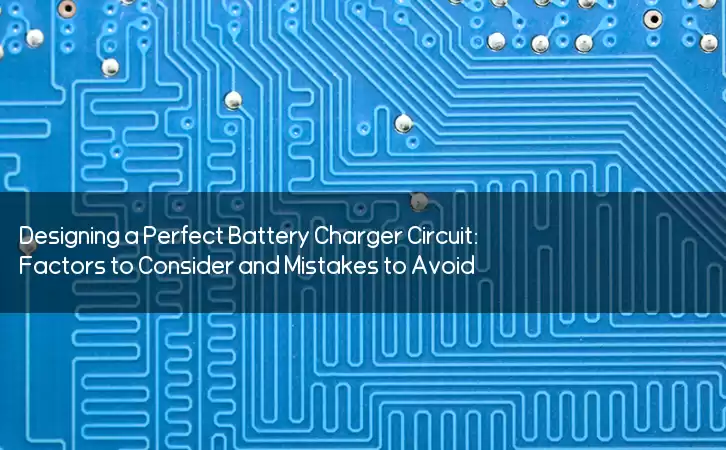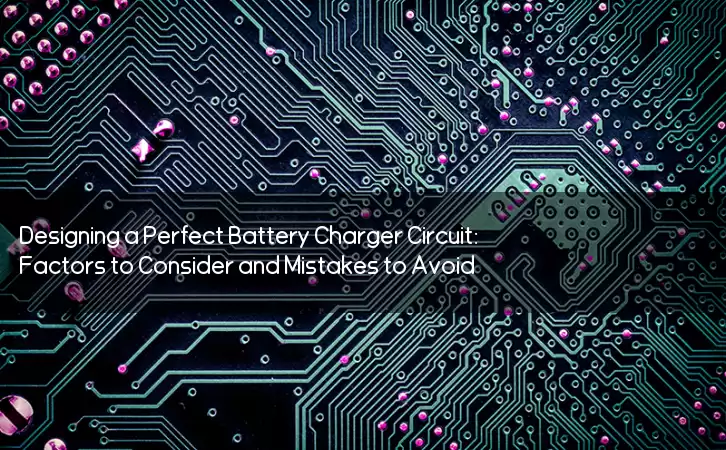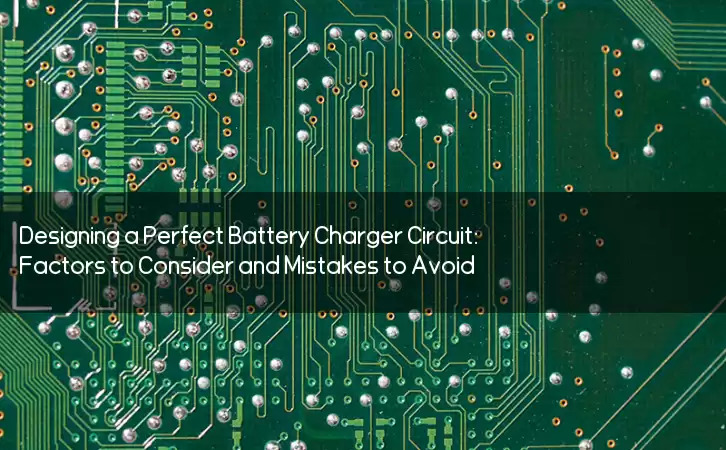Information Center
Designing a Perfect Battery Charger Circuit: Factors to Consider and Mistakes to Avoid
Published:2023-07-10 17:35:33 Author:Green WCND Views:66Battery Charger Circuit: Design and Considerations

A battery charger circuit is a device that is used to recharge a discharged battery. There are various types of battery chargers, ranging from simple circuits that use a few components to complicated circuits that employ advanced techniques such as pulse charging, smart charging etc.

When designing a battery charger, several factors must be taken into consideration, including the type of battery being charged, the capacity of the battery, the charging current and voltage, and the charging time. In this article, we will explore these factors in depth to help you design a battery charger circuit that is effective and efficient.

Battery Type
The first thing to consider when designing a battery charger circuit is the type of battery being charged. There are various types of batteries, such as lead-acid, Nickel-Cadmium (Ni-Cd), Nickel-Metal Hydride (Ni-MH) and Lithium-ion (Li-ion) batteries. Each of these batteries has different charging requirements.
For example, lead-acid batteries require a constant voltage, while Ni-Cd and Ni-MH batteries require a constant current. Li-ion batteries, on the other hand, require a constant current/constant voltage charging profile. Therefore, before designing a battery charger circuit, you must identify the type of battery being charged and its charging requirements.
Battery Capacity
The battery capacity is the amount of energy a battery can store. It is usually measured in Ampere-hours (Ah) or milliampere-hours (mAh). The higher the capacity of a battery, the longer it can last before needing to be recharged.
When designing a battery charger circuit, the charging current must be appropriately set to match the battery capacity. If the charging current is too high, it can damage the battery, and if it is too low, the charging time will be prolonged.
Charging Current and Voltage
The charging current and voltage are critical parameters for any battery charging circuit. The charging current must be capable of charging the battery within a reasonable time while maintaining the safety and lifespan of the battery.
The charging voltage, on the other hand, must be kept within safe limits set by the battery’s manufacturer. Excessive charging voltage can damage the battery, while insufficient charging voltage can lead to incomplete charging.
Charging Time
The charging time is the duration it takes to recharge a discharged battery. This time may vary with the battery capacity, charging current, and voltage. To avoid overcharging or undercharging, the charging time must be appropriately set.
If you try to recharge the battery too quickly, it can reduce the lifespan, and if it takes too long, it can cause the battery to lose capacity or fail. Therefore, it is essential to design a battery charger circuit that can charge the battery quickly and safely.
Conclusion
A battery charger circuit is an essential device that ensures continuity of operations in electronic applications that rely on batteries. When designing a battery charger circuit, it is critical to identify the type of battery, charging current and voltage, capacity, and charging time.
With the right charging profile, you can ensure that the battery is recharged quickly and safely, with minimal impact on its lifetime. By considering these factors, you can design a battery charger circuit that is reliable, efficient, and effective, and ensures that your battery-powered applications run smoothly.
Power Adapter Design and Customization Guide for Portable Electric KettlesI. Common Design Types for Portable Electric Kettle Power AdaptersPortable electric ke···
I. Common Design Types of Power Adapters External Independent Type (Most Common) Design: A standalone adapter (e.g., "black brick") connected to the p···
Handheld Vacuum Cleaner Power Adapter Selection GuideIntroductionHandheld vacuum cleaners have become a mainstream tool for household cleaning due to their port···
Drill Power Adapter Selection Guide.drill-container { font-family: Arial, sans-serif; line-height: 1.6; max-width: 800px; margin: 0 auto; padding: 20px; } .dril···





